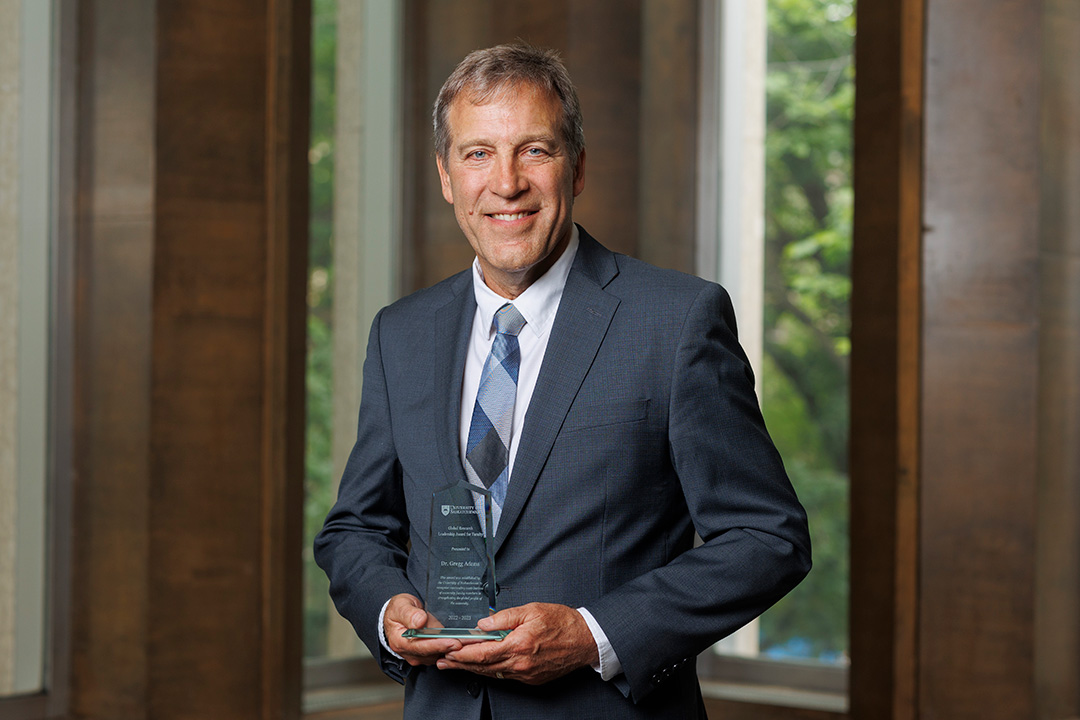
‘Lifelong curiosity’ driving force behind Adams’s global research success
“With any good research project, you should come away from it with many more questions than you have solutions,” says Dr. Gregg Adams, a professor and researcher in the Western College of Veterinary Medicine’s (WCVM) Department of Veterinary Biomedical Sciences.
By Tyler Schroeder“I’ve developed a great passion for research. Having a sense of wonder really is important — but thinking about what your findings mean and then finding applications for them in other areas is really rewarding.”
Adams is the 2023 recipient of the University of Saskatchewan (USask) Global Research Leadership Award for Faculty, which recognizes his contributions to research and leadership on an international level.
A career in veterinary medicine was an easy aspiration for Adams as a boy.
“I can’t remember a time in my life when I didn’t want to be a veterinarian,” says Adams. “My father’s a veterinarian, my uncle’s a veterinarian, my oldest brother’s a veterinarian. Dad would take us out on field calls, and it was something I was comfortable and had fun with.”
After graduating with distinction from the WCVM in 1982, Adams entered post-graduate studies at the University of Wisconsin’s School of Veterinary Medicine, where he became a clinical specialist in theriogenology and earned a PhD degree in reproductive physiology.
In 1991, Adams returned to Saskatoon and has spent the last 32 years building a global reputation for innovation in reproductive research at the WCVM and the university.
His many research projects include the long-term goal of creating the world’s first bison genome biobank, which aims to conserve and repopulate bison species through frozen genome technology. The project received international attention as well as a $5.1-million grant from Genome Canada in 2022.
“Bison are a threatened and indigenous species to Canada and North America, so it’s rewarding to work on a project with origins to Saskatchewan and the northern Prairies,” says Adams.
The BIG project benefits from and is enabled by a recent $17-million-dollar research initiative called “Integrated omics for sustainable animal agriculture and environmental stewardship” (IntegrOmes) that’s based at the USask Livestock and Forage Centre of Excellence (LFCE).
Adams is leading both the BIG project as well as IntegrOmes, which is supported by the Canada Foundation for Innovation’s Innovation Fund as well as contributions from federal, provincial and private agencies.
Adams’ research on ovarian function has also gathered global praise. In 2003, Discover Magazine included Adams and his team’s study on ovarian function in women as one of the top 100 scientific discoveries of the year.
“The concepts we were working on with ovarian function in cattle became a model for a lot of species including humans. It’s an adrenaline rush and a wonderful feeling to be able to move knowledge ahead.”
Reflecting on his accomplishments, Adams is grateful for his colleagues and the opportunities to explore his passions at USask.
“I’m really proud of this institution. We’ve had world-leading expertise in animal reproduction here for over 50 years. Having that kind of support has been crucial to all of our accomplishments.”
